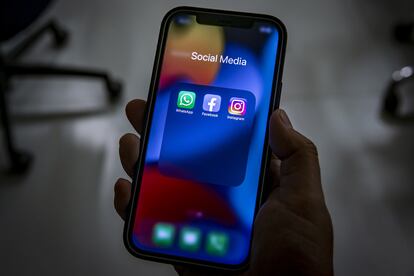Facebook vs. Instagram: Each generation has its social network
Boomers connected with their lost friends on Facebook. Millennials did it themselves through an Instagram filter. But one generation dominates the networks: Gen Z

“Facebook is the geriatric ward,” argues the British newspaper The Economist. “It’s the cemetery: you go in to see who has died,” says Felipe Romero, a partner at The Cocktail consulting firm. Its current mission is equivalent to that of the yellow pages at the end of the 20th century: to prove that you exist, or that you have at some time existed. It was the first social network and it brought boomers, generation Xers and millennials together in a happy conjunction where people reconnected with ex-boyfriends and schoolmates. There was human dialogue — that is, one person spoke and another answered — and no one on the platform was an artificial intelligence. There was laughter, tears, arguments, and reconciliations. That was engagement, but no one knew it: marketing jargon had not yet contaminated everything.
By 2012, leaving Facebook had become the ethical and moral posturing of millennials who stopped logging in but did not delete their accounts. Between active users and lost souls, there are 3.049 billion Facebook accounts. “Engagement time is low, but we are still there,” says Romero. In 2023, Facebook’s profits soared by 69%, thanks, among other things, to the millions invested by political parties and their candidates. In the “geriatric ward,” it gets messy from time to time. Nobody beats Facebook in emotional manipulation to create a sense of community against a common enemy. That is why it is still the field where the most delirious conspiracies play out.
Well into the second decade of the last century, between 1981 and 1996, a narcissistic and dramatic generation was born: millennials. They invented the selfie and a whole anthropological and esthetic category: the instagrammable. Instagram was filled with self-portraits, first amateurish and poorly lit, then quasi-professional. Facial recognition algorithms had a field day while a whole generation was pouting and trying out every available filter. The marketing experts who sublimated this generation at the time now say it is “the most stereotyped and vilified” generation on the internet. “People aged between 25 and 38 live the Instagram boom to the fullest, and many display a huge resistance to changing platform even when they consume content on Instagram bounced from Tik¬Tok,” says content creator and author Álvaro L. Pajares.
Pajares set up a TikTok account for his grandmother because he found it the easiest and most intuitive ecosystem for the elderly. She was delighted. “A lot of people over 50 are very happy there,” he says. Pew Research Center data show that 56% of U.S. adults aged 18-34 have a TikTok account, but only half have ever posted a video. This behavior is identical to that of users between 35 and 49 years of age on the same social network. On TikTok, most of us are voyeurs of what a highly professionalized minority creates. For Pew Research Center, the ultimate proof of how unimportant it is to socialize there is that 70% of users do not fill in their biography field and have never received a like.
Generation Z, born between 1997 and 2012, is the most sophisticated generation in the use of social networks and has no need to socialize, at least not like their predecessors did. They post and they don’t care what their followers think. They are the true digital natives and they surf the web with their own rules. A Gallup survey from 2023 claims that the late Generation Z spends about five hours online every day, but hopping between seven different platforms. They are in the majority on Instagram (Gallup estimates that 80% of gen-zedders will be there by 2027, compared to 79.1% who will have TikTok accounts), but they spend more time on the Chinese platform. Struck by confinement during the pandemic, Generation Z saw their school schedules and leisure time contaminated on screens. That’s why they are passionate about routines. The longer and neater, the better: 1,000-step skincare, rules for taking a eucalyptus bath, hierarchies for organizing the closet by range of whites. Order, control and an Anglo-Saxon word for everything: esthetic.
Curiously, a generation that doesn’t seem eager to cultivate anarchy is iconoclastic with its networks: Generation Z spends two-thirds of its day on TikTok but goes to Instagram to send direct messages; it swaps Google for TikTok for searches, and has a good time on X, the former Twitter. The gen-zedders have turned X into a huge streaming forum for commenting on reality television. According to the Gallup survey, while other generations gave Elon Musk the cold shoulder (almost 10% abandoned Twitter after the tech magnate’s purchase of the platform), only 2% of Gen-Z users left. For them, X is not a confrontational space. Another surprising statistic: Andrew McCaskill, career expert at LinkedIn, an adult-focused and bland network, told The Cut that 41% of content on the platform between 2021 and 2023 had been created by gen-zedders.
The latest demographic pirouette heralds the advent of the Alpha generation, described as the mini-millennials in some quarters. These are currently aged under 14 and 2.8 million are born every week in the world. The UK newspaper The Times profiles them thus: “They know how to edit a video but not how to tie a shoelace. They eat sushi and think spam is a type of email. They will learn to drive in an electric car and have never seen a landline telephone.” We could add: they lock themselves in the bathroom with their parents’ phone and TikTok account, and take retinol before the age of 12... It will be the largest generation in history. Perhaps they will no longer be amused by social networks. A fast-paced, intelligent, and artificial world awaits them.
Sign up for our weekly newsletter to get more English-language news coverage from EL PAÍS USA Edition
Tu suscripción se está usando en otro dispositivo
¿Quieres añadir otro usuario a tu suscripción?
Si continúas leyendo en este dispositivo, no se podrá leer en el otro.
FlechaTu suscripción se está usando en otro dispositivo y solo puedes acceder a EL PAÍS desde un dispositivo a la vez.
Si quieres compartir tu cuenta, cambia tu suscripción a la modalidad Premium, así podrás añadir otro usuario. Cada uno accederá con su propia cuenta de email, lo que os permitirá personalizar vuestra experiencia en EL PAÍS.
¿Tienes una suscripción de empresa? Accede aquí para contratar más cuentas.
En el caso de no saber quién está usando tu cuenta, te recomendamos cambiar tu contraseña aquí.
Si decides continuar compartiendo tu cuenta, este mensaje se mostrará en tu dispositivo y en el de la otra persona que está usando tu cuenta de forma indefinida, afectando a tu experiencia de lectura. Puedes consultar aquí los términos y condiciones de la suscripción digital.









































